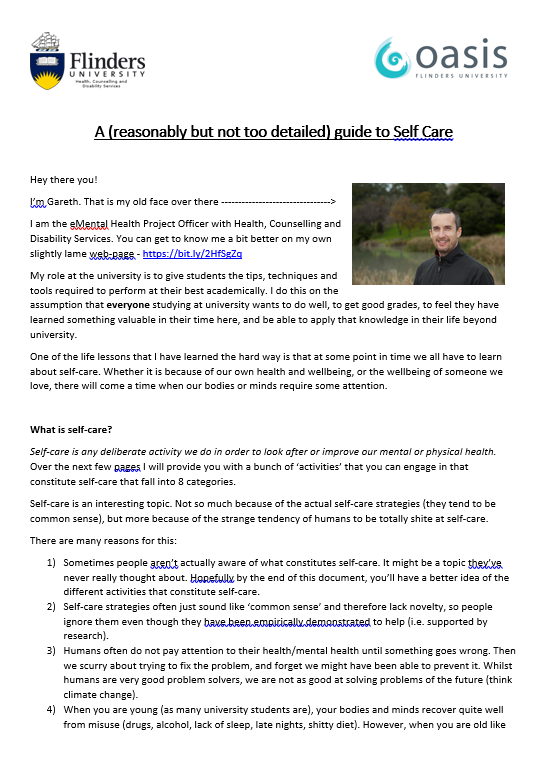
Update: we now have a new Self Care Mega Guide with extra strategies and our service pamphlet attached to the back. A nice upgrade on the one described in this post.
Modern life places a lot of demands on our physical, cognitive and emotional resources.
Internally, we have expectations of ourselves to perform at a high level, across multiple domains, for long periods of time.
Externally, we might also experience similar expectations from others: family, friends, work colleagues.
If there is one reality I encounter regularly, is that most people are ‘very busy’ and are feeling the pressure to stay on top of the different aspects of their life: work, study, family, friends, hobbies and social responsibilities.
This level of pressure leads many people to start neglecting their own health and wellbeing. It might be as simple as not getting enough sleep, or drinking a little extra wine to unwind at the end of the day. However it can build up to a point where a person is neglecting their health and wellbeing to the point that their ability to perform does become compromised.
When I talk with people about self-care, a common reaction is that “I know that, but….”. People are aware that self-care is important, but find reasons to refute the importance of it to them. I have definitely done this. It wasn’t until my health became quite compromised a few years back, and my ability to keep the parts of my life afloat took a hit, that I started taking self-care seriously.
Over the last couple of years, I’ve been pulling together what I know about self-care into a model of mental fitness that now underpins much of the advice that I provide to students, and is the basis of documents like “How to prepare yourself mentally for work placements” and “A quick guide to self-care for mentors“.
That model emphasises 11 domains of self-care, that encompass a range of individual strategies.
Building positive emotions
Managing challenging emotions
Thinking better
Self-awareness and understanding
Meaning, purpose and identity
Building supportive relationships
Caring for your body
Developing the skills for professional success
Modifying your environment
Financial literacy
Having fun and unwinding
In the attached document, I go through each of these areas and provide some starting points for how you might incorporate this domain of self-care into your own life.
This guide to self-care is a work in progress, one which I will continue to develop and refine over time, adding new strategies as my understanding of the literature improves.
In the meantime, I hope you find something of value in this document.
All feedback and suggestions welcome (please let me know – gareth.furber@flinders.edu.au – if the links are broken).


